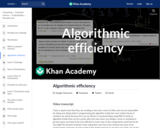
How can we improve the speed of a (deterministic) primality test? Created by Brit Cruise.
- Subject:
- Applied Science
- Computer Science
- Material Type:
- Lesson
- Provider:
- Khan Academy
- Provider Set:
- Code.org
- Author:
- Brit Cruise
- Date Added:
- 07/14/2021

How can we improve the speed of a (deterministic) primality test? Created by Brit Cruise.
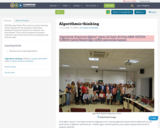
2023 Education Vision "Face to face in-service trainings will be organized for the teaching of algorithmic thinking of classroom teachers in a computer-free environment." The in-service program was opened within the scope of the study, which was initiated in line with the target.

This resource is a video abstract of a research paper created by Research Square on behalf of its authors. It provides a synopsis that's easy to understand, and can be used to introduce the topics it covers to students, researchers, and the general public. The video's transcript is also provided in full, with a portion provided below for preview:
"A new algorithm has successfully mapped part of the brain’s circuitry during shock therapy. For those suffering from severe depression, the approach could make for safer and more effective treatment. For brain research at large, it could lead to better ways of untangling noisy neural data to reveal real connections between different focal regions of the brain. Despite the gruesome picture painted by pop culture, modern shock therapy is a mild treatment option. In fact, over 2 million treatments are administered worldwide every year. Under general anesthesia, patients receive a small amount of current to the brain, triggering a brief seizure. The resulting changes in brain chemistry have been shown to reverse symptoms of mental health conditions like severe depression or bipolar disorder. But the procedure isn’t perfect. One of the most troubling side effects is memory loss, a result of poor targeting. To be effective and safe, induced seizures should be restricted to the pre-frontal cortex..."
The rest of the transcript, along with a link to the research itself, is available on the resource itself.

This book aims to be an accessible introduction into the design and analysis of efficient algorithms. Throughout the book we will introduce only the most basic techniques and describe the rigorous mathematical methods needed to analyze them.
The topics covered include:
The divide and conquer technique.
The use of randomization in algorithms.
The general, but typically inefficient, backtracking technique.
Dynamic programming as an efficient optimization for some backtracking algorithms.
Greedy algorithms as an optimization of other kinds of backtracking algorithms.
Hill-climbing techniques, including network flow.
The goal of the book is to show you how you can methodically apply different techniques to your own algorithms to make them more efficient. While this book mostly highlights general techniques, some well-known algorithms are also looked at in depth. This book is written so it can be read from "cover to cover" in the length of a semester, where sections marked with a * may be skipped.
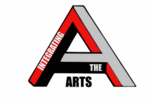
This resource was created by Jenny Motacek, in collaboration with Dawn DeTurk, Hannah Blomstedt, and Julie Albrecht, as part of ESU2's Integrating the Arts project. This project is a four year initiative focused on integrating arts into the core curriculum through teacher education, practice, and coaching.

This is a textbook for first year Computer Science. Algorithms and Data Structures With Applications to Graphics and Geometry.
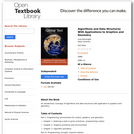
This textbook is an introductory coverage of algorithms and data structures with application to graphics and geometry.
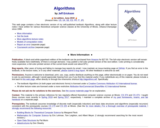
This web page contains a free electronic version of my self-published textbook Algorithms, along with other lecture notes I have written for various theoretical computer science classes at the University of Illinois, Urbana-Champaign

This course is offered to undergraduates and addresses several algorithmic challenges in computational biology. The principles of algorithmic design for biological datasets are studied and existing algorithms analyzed for application to real datasets. Topics covered include: biological sequence analysis, gene identification, regulatory motif discovery, genome assembly, genome duplication and rearrangements, evolutionary theory, clustering algorithms, and scale-free networks.

Animation is a compelling and effective form of expression; it engages viewers and makes difficult concepts easier to grasp. Today’s animation industry creates films, special effects, and games with stunning visual detail and quality. This graduate class will investigate the algorithms that make these animations possible: keyframing, inverse kinematics, physical simulation, optimization, optimal control, motion capture, and data-driven methods. Our study will also reveal the shortcomings of these sophisticated tools. The students will propose improvements and explore new methods for computer animation in semester-long research projects. The course should appeal to both students with general interest in computer graphics and students interested in new applications of machine learning, robotics, biomechanics, physics, applied mathematics and scientific computing.

This is a graduate-level introduction to the principles of statistical inference with probabilistic models defined using graphical representations. The material in this course constitutes a common foundation for work in machine learning, signal processing, artificial intelligence, computer vision, control, and communication. Ultimately, the subject is about teaching you contemporary approaches to, and perspectives on, problems of statistical inference.

This course treats various methods to design and analyze datastructures and algorithms for a wide range of problems. The most important new datastructure treated is the graph, and the general methods introduced are: greedy algorithms, divide and conquer, dynamic programming and network flow algorithms. These general methods are explained by a number of concrete examples, such as simple scheduling algorithms, Dijkstra, Ford-Fulkerson, minimum spanning tree, closest-pair-of-points, knapsack, and Bellman-Ford. Throughout this course there is significant attention to proving the correctness of the discussed algorithms. All material for this course is in English. The recorded lectures, however, are in Dutch.

Anila Quayyum Agha’s installation Alhambra Nights was selected to be included in the City of Cincinnati’s BLINK festival. The event spanned twenty city blocks and included light, interactive art, and large-scale projection mapping. Inspired by Agha’s visit to the Alhambra and her efforts to connect traditional Islamic art and architecture with contemporary technology and Western audiences.

Alice Coachman was the first Black woman from any country to win an Olympic gold medal.
This resource is from a collection of biographies of famous women. It is provided by the National Women's History Museum, and may include links to supplemental materials including lesson plans about the subject and related topics, links to related biographies, and "works cited" pages. The biographies are sponsored by Susan D. Whiting.

Born into poverty in rural Georgia and raised under the shadows of Jim Crow segregation and the Great Depression, Alice Coachman fought through gender taboos and racial barriers to become a record-breaking track star. Then, in the 1948 London Olympics (the first to be held after WWII), she leapt to victory in the high jump and became the first black woman in history to win Olympic gold. One of postwar America’s most high-profile athletes and the first African American woman to be spokesperson for a national brand, Coachman’s life and achievements were honored during the 1996 Atlanta Olympic games.
The Woodson Center's Black History and Excellence curriculum is based on the Woodson Principles and tells the stories of Black Americans whose tenacity and resilience enabled them to overcome adversity and make invaluable contributions to our country. It also teaches character and decision-making skills that equip students to take charge of their futures. These lessons in Black American excellence are free and publicly available for all.

Born into poverty in rural Georgia and raised under the shadows of Jim Crow segregation and the Great Depression, Alice Coachman fought through gender taboos and racial barriers to become a record-breaking track star. Then, in the 1948 London Olympics (the first to be held after WWII), she leapt to victory in the high jump and became the first Black woman in history to win Olympic gold. One of postwar America’s most high-profile athletes and the first African American woman to be spokesperson for a national brand, Coachman’s life and achievements were honored during the 1996 Atlanta Olympic games.The Woodson Center's Black History and Excellence curriculum is based on the Woodson Principles and tells the stories of Black Americans whose tenacity and resilience enabled them to overcome adversity and make invaluable contributions to our country. It also teaches character and decision-making skills that equip students to take charge of their futures. These lessons in Black American excellence are free and publicly available for all.
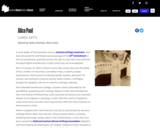
A vocal leader of the 20th century women’s suffrage movement, Alice Paul advocated for and helped secure passage of the 19th Amendment.
This resource is from a collection of biographies of famous women. It is provided by the National Women's History Museum, and may include links to supplemental materials including lesson plans about the subject and related topics, links to related biographies, and "works cited" pages. The biographies are sponsored by Susan D. Whiting.
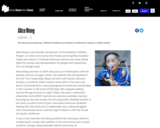
Alice Wong is the founder and director of the Disability Visibility Project, an online community that fosters and amplifies disability media and culture.
This resource is from a collection of biographies of famous women. It is provided by the National Women's History Museum, and may include links to supplemental materials including lesson plans about the subject and related topics, links to related biographies, and "works cited" pages. The biographies are sponsored by Susan D. Whiting.

Es una página web que contiene un video sobre la historia de Alicia quien vive estereotipos de género durante la escuela. El fin de este recurso es hacer consciencia y lograr un cambio en los roles de género que se les otorgan a las niñas y niños.

What kiddo doesn't want to launch something across the room?! In this challenge, students work to launch an alien the greatest distance using everyday materials. This is a challenge that can easily be adapted to different age groups and a variety of circumstances such as needing substitute plans or just beginning the wonderful world of STEM.